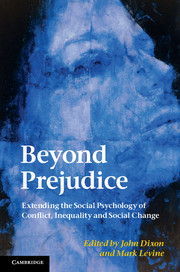Book contents
- Frontmatter
- Contents
- Figures
- Tables
- Contributors
- Acknowledgements
- Introduction
- Part I Beyond prejudice
- 1 From perception to mobilization: the shifting paradigm of prejudice
- 2 Prejudice, social identity and social change: resolving the Allportian problematic
- 3 An ambivalent alliance: hostile and benevolent sexism as complementary justifications for gender inequality
- 4 Prejudice and dehumanization
- 5 Stereotyping, prejudice and discrimination revisited
- 6 Beyond ‘old’ and ‘new’: for a social psychology of racism
- 7 The notion of ‘prejudice’: some rhetorical and ideological aspects
- 8 The prejudice problematic
- 9 Implicit prejudice in mind and interaction
- 10 Rethinking the prejudice problematic: a collaborative cognition approach
- Part II Prejudice and social change revisited
- Index
- References
1 - From perception to mobilization: the shifting paradigm of prejudice
from Part I - Beyond prejudice
Published online by Cambridge University Press: 05 June 2012
- Frontmatter
- Contents
- Figures
- Tables
- Contributors
- Acknowledgements
- Introduction
- Part I Beyond prejudice
- 1 From perception to mobilization: the shifting paradigm of prejudice
- 2 Prejudice, social identity and social change: resolving the Allportian problematic
- 3 An ambivalent alliance: hostile and benevolent sexism as complementary justifications for gender inequality
- 4 Prejudice and dehumanization
- 5 Stereotyping, prejudice and discrimination revisited
- 6 Beyond ‘old’ and ‘new’: for a social psychology of racism
- 7 The notion of ‘prejudice’: some rhetorical and ideological aspects
- 8 The prejudice problematic
- 9 Implicit prejudice in mind and interaction
- 10 Rethinking the prejudice problematic: a collaborative cognition approach
- Part II Prejudice and social change revisited
- Index
- References
Summary
Introduction:
On 18 July 1950, the United Nations Educational, Scientific and Cultural Organization (UNESCO) issued its first statement on ‘the race question’. Shortly afterwards, this was published in a document entitled ‘UNESCO and its programme’. The introduction to this document starts by asserting that ‘[t]he importance which the problem of race has acquired in the modern world scarcely needs to be pointed out’. It goes on to cite a resolution passed at the sixth session of UNESCO in 1948 which called for ‘the general adoption of a programme of dissemination of scientific facts designed to bring about the disappearance of that which is commonly called race prejudice’.
The resolution reflects a somewhat optimistic belief that prejudice is the product of a misunderstanding of the facts concerning racial categorization and racial difference and that, once these misunderstandings are resolved in the glare of scientific truth, so the problem of prejudice will likewise be resolved. In time, this optimism has faded; for all the best efforts of science over the ensuing sixty years, ‘the race question’ has not gone away. Accordingly, the ‘Outcome document’ from the latest United Nations conference on racism – the Durban Review Conference held in Geneva in 2009 – ‘emphasizes the need to address with greater resolve and political will all forms and manifestations of racism, racial discrimination, xenophobia and related intolerance, in all spheres of life and in all parts of the world’. Or, to cite Ban Ki-moon, Secretary General of the United Nations, speaking amid the controversies that blighted this Conference, the priority continues to be ‘to build constructive solutions to the very real problem of racism’.
- Type
- Chapter
- Information
- Beyond PrejudiceExtending the Social Psychology of Conflict, Inequality and Social Change, pp. 27 - 47Publisher: Cambridge University PressPrint publication year: 2012
References
- 27
- Cited by



